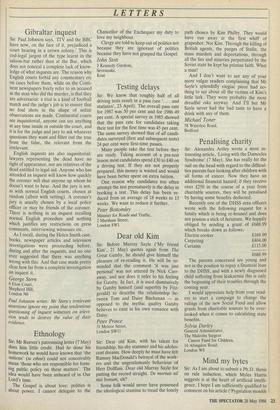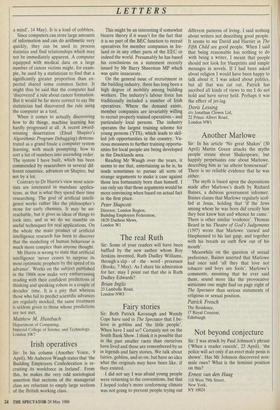Mind my bytes
Sir: As I am about to submit a Ph.D. thesis on rule induction, which Myles Harris suggests is at the heart of artificial intelli- gence, I hope I am sufficiently qualified to comment on his article (Pygmalion moulds
LETTERS
a mind', 14 May). It is a load of cobblers.
Since computers can store large amounts of information and can do arithmetic very quickly, they can be used to process statistics and find relationships which may not be immediately apparent. A computer equipped with medical data on a large number of cancer victims might, for exam- ple, be used by a statistician to find that a significantly greater proportion than ex- pected shared some common factor. It might thus be said that the computer had 'discovered' a rule about cancer formation. But it would be far more correct to say the statistician had discovered the rule using the computer as a tool.
When it comes to actually discovering how to do things, machine learning has hardly progressed at all. A recent award- winning dissertation (Ehud Shapiro's Algorithmic Program Debugging) demons- trated as a grand finale a computer system learning, with much prompting, how to sort a list of numbers into ascending order. The system I have built, which has been commended by researchers in several dif- ferent countries, advances on Shapiro, but not by a lot.
Contrary to Dr Harris's view most scien- tists are interested in mundane applica- tions, as that is what they spend their time researching. The goal of artificial intelli- gence works rather like the philosopher's stone for early chemists. It may be un- reachable, but it gives us ideas of things to look into, and as we do we stumble on useful techniques for real applications. On the whole the main product of artificial intelligence research has been to discover that the modelling of human behaviour is much more complex than anyone thought.
Mr Harris is wrong to state that artificial intelligence 'never ceases to surprise its most optimistic prophets by the speed of its advance'. Works on the subject published in the 1960s now make very embarrassing reading with their confident predictions of thinking and speaking robots in a couple of decades' time. It is a pity that whereas those who fail to predict scientific advances are regularly mocked, the same treatment is seldom given to those whose predictions are not met.
Matthew M. Huntbach
Department of Computing, Imperial College of Science and Technology. London SW7



















































 Previous page
Previous page